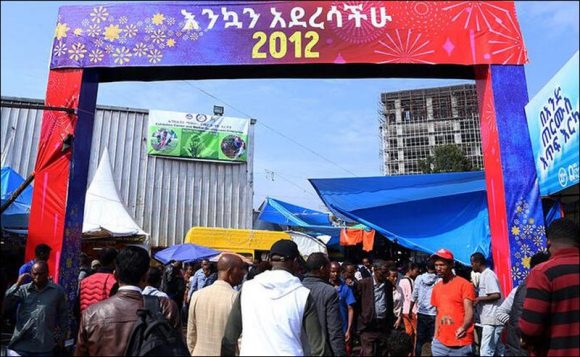Ethiopia, which continues to use its own calendar, entered 2012. The Ethiopian calendar, which is a sun-based calendar, follows the progress of history in the Gregorian calendar by 7 years and 8 months.
Ethiopia, one of the ancient civilizations of Africa and using its own unique calendar and clock system, entered 2012. The first day of the year, the so-called “Enkutataş” was declared a holiday in the whole country, the “Christmas forgiveness”, which became a tradition, benefited about 8,000 prisoners throughout the country this year.
Enkutataş, which is accepted as the end of the rainy season with the new year and the beginning of the harvest period, is the first day of Meskerem, the first month of the Ethiopian calendar.
The flower, which is identified with the new year due to the harvest of yellow daisies called “Adey Ababa” during this period, is one of the main symbols of the celebrations throughout the country.
Enkutataş’ı young girls walking around the streets to celebrate singing door to door, singing, established rich tables and mutual gifts are among the sine qua non of this special day.
Local calendar for official affairs
The Ethiopian calendar, which is a sun-based calendar, is a religious calendar for Ethiopian and Eritrean Christians, and is used by the Ethiopian government in all official affairs.
The Ethiopian calendar, which follows the progress of history in the Gregorian calendar about 7 years and 8 months behind, is similar to the calendar used by Coptic Christians in Egypt. The reason why this calendar differs from other calendars in terms of milestones is Jesus’ gospel and different calculation of birth.
Instead of the Julian calendar, the Gregorian calendar, which began to be used in the 16th century, was based on the calculation of the turning point of Roman mathematician Dionysius Exiguus as a turning point. He assumes that the gospel of Jesus is about 7-8 years different.
The Ethiopian calendar, like the Coptic calendar, has 12 months of 30 days and the 13th month of 5 or 6 residual days. According to this calendar, the new year is entered on 11 or 12 September. There are different rumors about the naming of Enkutataş, the first day of the new year.
The most remarkable of these rumors is the ruler of the Saba Kingdom, which established dominance over the lands of today’s Ethiopia and Yemen. Sending valuable gifts such as jewelry to the Prophet before his meeting with Solomon. It is believed that the word Enkutataş, the beginning of the new year, comes from the word “enku” in the Amharic language.
Day begins at morning instead of midnight
In addition to its own timetable, Ethiopian people who use different time systems start the day at 06.00 instead of 00.00. The day consists of two 12-hour sections. The first 12-hour time zone starts at 06.00 and the second time starts at 18.00.
This time zone used by every Ethiopian causes foreigners living in the country from time to time. So Ethiopians are often forced to tell whether their meeting time is Ethiopian when they are contacting foreigners who lives in the country.
Views: 749



